Google announces that it will gradually activate the APIs included in the privacy sandbox, such as the ability for the browser to guess interests and interests based on the browsing history and share them with advertisers

After seeing a product on one site, many people have the experience of seeing an advertisement for that product on a completely different site. Google is promoting a 'privacy sandbox' as an effort to protect privacy by preventing user tracking between such sites. In Chrome, Google announced that it will gradually enable the 'Relevance and Measurement API' from the week of July 24, 2023 as part of its privacy sandbox efforts. A total of 6 APIs are scheduled to be added, including the 'Topics API', which is a function that infers interests based on browsing history.
Shipping the Privacy Sandbox relevance and measurement APIs - Chrome Developers
The following APIs are planned to be added.
◆ Topics API
However, simply abolishing third-party cookies will result in the display of advertisements that are completely uninteresting to users, so it was devised to display advertisements that match the interests and interests of users while protecting privacy Topics API is. With the Topics API, the user's interests and targets of interest are calculated within the browser based on the browsing history, and only the calculation results are communicated to the advertiser, making it possible to continue displaying advertisements that match the interest while improving the conventional situation where 'browsing history is leaked due to tracking by the advertising company'.
◆Protected Audience API
Protected Audience API is an API that enables remarketing to users who have visited the product or service site once while protecting their privacy. By registering a domain with a specific 'interest group' in a user's browser when they first visit the site, we enable them to participate in bidding for inventory when the user subsequently visits another site.
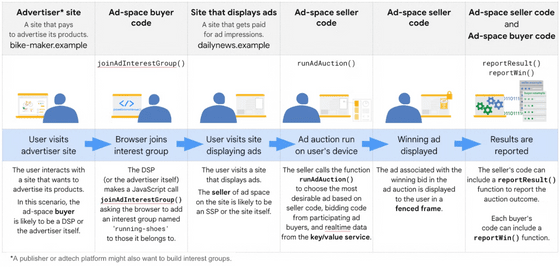
◆ Attribution report
An API for measuring ad conversions without the use of third-party cookies.
◆Private Aggregation API
Traditionally, sites were able to know the attributes of each user accessing the site. With the Private Aggregation API, when the site collects user data such as attributes, it is encrypted on the browser side, and by leaving the decryption and statistical processing to a reliable aggregation service, the user's personal data is not passed to the site.

◆ Storage partitioning
The iframe embedded in the site will use its own storage. For example, if you embed a site called 'shoes.example' in an iframe on a site called 'news.example', it was possible to use the same storage as the original site 'shoes.example'.
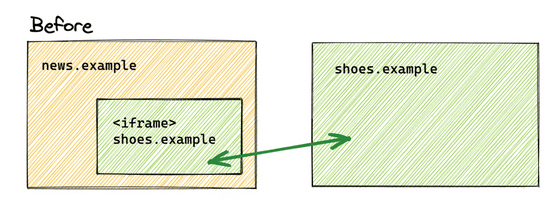
When storage partitioning is done, each embedding site uses separate storage, which means one less way to track users between sites.
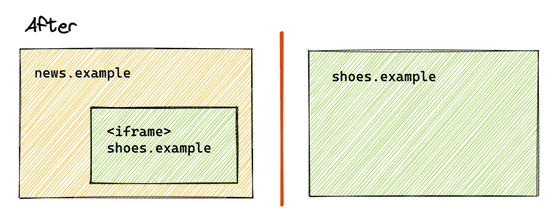
◆ Introduced 'Fenced Frames'
By using Fenced Frames, you can embed the contents of other sites in the website like iframes, but unlike iframes, you can not exchange data between the embedded site and the embedded site. For example, if the advertisement is delivered with Fenced Frames, the advertiser will not be able to obtain the data of 'which URL on which site the advertisement was displayed'. On the other hand, the site that displays the advertisement cannot obtain the data 'what kind of advertisement was displayed'.
Enabling these APIs is a gradual process. Activation will begin the week of July 24th, 2023, with approximately 35% of users expected to have the API enabled within a week. In addition to groups in which all APIs are enabled, creating groups in which only some APIs are enabled improves the identification speed when problems occur. After that, if all goes well, the API is expected to be enabled in 60% of browsers by early August, and 99% before the release of Chrome 116 on August 15th.
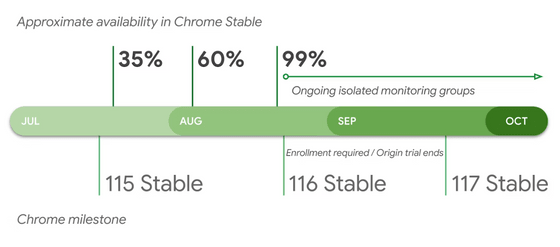
When the API is enabled, an item called 'Ad Privacy' will be added to 'Privacy and Security' on the setting screen.
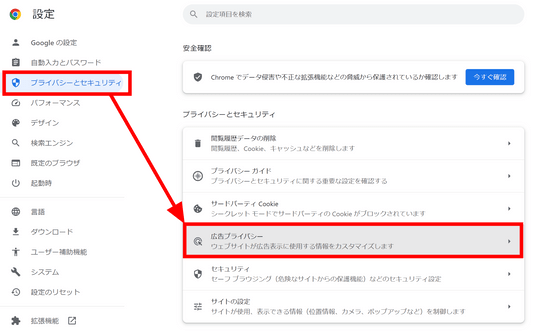
By editing this setting, it seems that it is possible to enable / disable the API introduced this time, set to exclude specific sites, delete data saved in the browser, etc. However, the UI may change upon release.
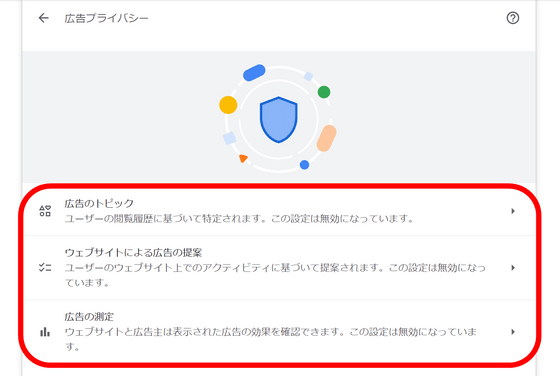
In addition, we plan to start an experiment to abolish third-party cookies currently used for user tracking between sites in 2024.
Google announces that it will start an experiment to abolish third-party cookies for 1% of Chrome users in 2024-GIGAZINE

Related Posts:
in Software, Posted by log1d_ts





